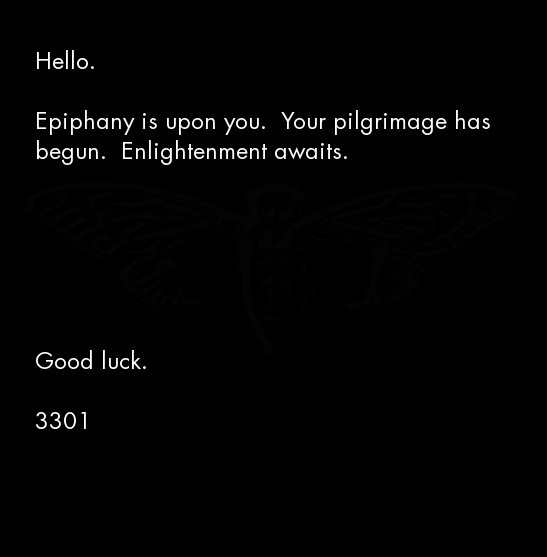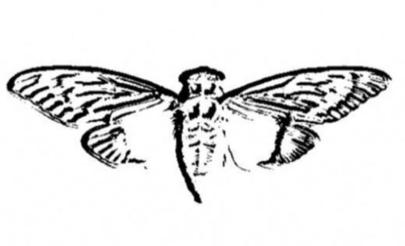Sunday, March 2, 2014
In the Tom Cruise-movie version of this, that teenage hacker turns out to be the mastermind.
Today, I was looking up on Wikipedia
whether cicadas live in Africa (turns out they do!) because I was writing a story in which I wanted cicadas to live in Africa.
That alone was weird. I almost never research anything in a story, period, because I write fiction but I wanted a couple of details to flesh out the story, so I looked up French station wagons, old-fashioned cars, and whether cicada live in Africa, and it was on the last one that I noticed something called Cicada 3301.
I was in a hurry to finish the story (which is done and which is quite good, eventually you'll get to read it's called Zanzibar and is not science fiction, so enough about it here) and so I glanced at Cicada 3301 and was intrigued but didn't do more than just bookmark it for later.
What happens is this: If you start to type cicada into Google, one of the suggestions it offers up is cicada 3301, which, when I saw it on the list, I chose and found this blurb under a Wikipedia for that name:
Cicada 3301 is a name given to an anonymous organization that on three occasions has posted a set of complex puzzles, purportedly to recruit capable ...
That was what I marked to look at later, and what I found when I sat down to read the entire Cicada 3301 story was so weird it was worth mentioning here, on a speculative fiction blog, because the entire thing sounds made up, and if you put it in a story people would assume it's pure fiction.
But it's not.
According to Wikipedia and a few sites I went and read, that message appeared on Reddit in January 2012, and caught the attention of the kind of people who like solving cryptography puzzles, and became more and more of a big deal among people as time went on.
The reason it became more and more of a big deal is because of how elaborate it turns out this was. The code hidden in that page apparently led to another clue, and was pretty difficult to break, and that new clue led to another clue, and so on, until eventually people who were trying to solve it were having to travel to 21 different locations around the world, from Des Moines, Iowa, to Okinawa to Moscow to Hawaii, where apparently clues were all placed at the same time, making it seem this wasn't really the work of some little hacker group. (To solve the puzzle, you had to go to the site and scan in a code, which looked like this:
That's a lightpost in Warsaw, Poland.
The clues also required an expansive knowledge of everything from an ancient book of the dead to Bach's music to the Kabbalah to Number Theory to something called "Strange loops", and each clue apparently got harder and harder.
And through it all, nobody had any idea who was doing this stuff. Theories ranged from government agencies recruiting cryptologists to major banks wanting to hire people to serve as Bitcoin miners -- probably the only mining you could do that wouldn't be superdangerous, unless you count having to know people who know how to access Silk Road -- but nobody ever stepped forward to claim responsibility for it. The secrecy surrounding Cicada 3301 caused Chile to name the group a terrorist organization at one point, and the people (?) behind it had to issue a statement denying that.
A few people solved the mystery, including a teenage hacker who didn't want his real name used, and were rewarded with a website that asked them to give their contact details. That site soon shut down. The teenager who solved it gave an interview and said that having solved it, he got an email with a personality quiz and then a password onto the "dark net," where he could log on and communicate with others.
That teenager said (the article is here) that the aim of the group was to put together programmers to build open source software for the good of humanity. But if that's the case, why shut the website off after the first few to solve it?
And why run it again?
And again?
The same thing happened --with a different code and different clues -- in January 2013, and again in January 2014. The image that opened this year's Cicada 3301 is the one that starts this post.
Another guy who solved it said the site shut down because the people behind Cicada 3301 were disappointed that people were teaming up to solve the puzzles and sharing information. That article (which is here) had more of the puzzles in it, including finding numbers hidden in images that then decode to be a phone number in Texas, which gives you a prime number puzzle that leads to a website, and so on.
As for whether that teen was telling the truth about it simply being a group of people writing open source code? Consider that no other person that I could find on the Internet came forward and said they solved it, and Wikipedia does not have an answer as to what Cicada 3301 is, either. NPR and a reporter covering the story over the years both say nobody actually knows what Cicada 3301 is, and that's from an article published January 5, 2014.
The whole thing fascinated me enough that I spent an hour reading about it, period, and I found a new site that is tracking how Cicada 3301 is going for this year. The page is hard to understand (it's right here) but it appears that the first step was to use a program called "Outguess" to decode the image in order to get a link to a .pdf of Ralph Waldo Emerson's "Self-Reliance" posted on the Dartmouth math website. A clue to using Outguess was included in the results one would get on the first puzzle, two years ago, if you tried to decode it wrong:
I should probably tie this more into writing, and here is how I will do that: this past week we were blogging about what we learned from reading, and I mentioned that writers tell you to read all the time and read a lot. This is one of those things that you learn just from reading, almost anything. If I hadn't had the curiosity to go read this, I'd have never known that there was anything as mind-blowing as this going on, as it hadn't really made any news anywhere where I usually go read. But now, having found something like this, I can use the idea of it and the kinds of things it made me think about in my writing in the future. (Which, having just finished writing a book about an intricate series of crosses and double-crosses and cloning and computing and corporations, one I'm now editing, I can almost certainly make use of immediately.)
There's no bad reading. If you're reading Emerson or comic books or skimming random Wikipedia articles, you're exercising your mind (just like I said!) and that will make you a better writer, even without coming across something as fascinating as Cicada 3301.
And what is that? Your guess is as good as mine: was the teenage hacker telling the truth that he'd solved it and it's just some people having fun with the Internet? Or is it something more bizarre, or more mundane?
I'm hoping it's more bizarre. *fingers crossed* that it's a mad genius living alone on an island trying to pick the select few he will give super powers to. Not that it would help me. I hate these kind of puzzles. But I can put Mr F and Mr Bunches on it...
____________________________________________________________________________
Briane Pagel doesn't even do crosswords anymore and he is awful at chess. But he blogs at Thinking The Lions and his stories appear on lit, a place for stories, and on Inky, and he has a lot of books available on Amazon that you can read without having to decipher ANYTHING.
Subscribe to:
Post Comments (Atom)






That's pretty interesting. It reminds me of this book that came out when I was in middle school, an art book of animals with clues hidden the pictures. If you solved, you could get a bunch of money. Or something. I don't quite remember.
ReplyDeleteWhy cicada? I'm sure there's something significant in that.
At least it didn't turn out to be a movie promo or a commercial for Ovaltine.
ReplyDeleteMy guess is that this group's plan will come to fruition seventeen years after they started this project.
ReplyDeleteAndrew: I looked it up. The book was "Masquerade," and if you read about it on Wikipedia it, too, is a fascinating story.
ReplyDeletePT: I know, right? That would be VERY disappointing.
Sandra: I had to think about that one for a second. EXCELLENT. And what if it turns out you're right? If they plan stuff as carefully as they seem to, then the name "Cicada" must have some meaning, right?
By the way: I googled 3301 to find out what that might mean, and there is a gene labeled 3301. I can't make heads or tails of what they say about it, but maybe someone with a science background could say what that gene does, if anything.
Okay, I better go look that up right now. Without even being home, my kids have used up half of my day, and I'm running behind.
ReplyDelete(And that's what I meant about the cicadas, though there are other variations than just the 17-year kind.)
So both you and Sandra think it's a 17-year thing. You might be right.
ReplyDeleteI'm not locked into 17 years. They have different cycles depending upon the type, some as short as three years, though I'm thinking that's probably not it.
ReplyDelete